Related Research Articles

Damal Krishnaswamy Pattammal, popularly known as D. K. Pattammal or DKP, was an Indian Carnatic musician and a playback singer for film songs in Tamil. Pattammal, along with her contemporaries M. S. Subbulakshmi and M. L. Vasanthakumari, are popularly referred to as the female trinity of Carnatic Music. This trio initiated the entry of women into mainstream Carnatic Music. She has been appreciated all over the world by Carnatic music lovers.

Semmangudi Radhakrishna Srinivasa Iyer was an Indian Carnatic vocalist. He was the youngest recipient of the Sangeetha Kalanidhi awarded by the Music Academy in 1947, a distinction he holds to this day as of 2023, probably the only musician to receive that honour before reaching 40. He had received many other awards as well, including Padma Bhushan and Padma Vibhushan from the Government of India, Rajyasevanirata title from Travancore's erstwhile ruling family, Sangeet Natak Academy award (1953), Isai Perarignar from Government of Tamil Nadu and Kalidas Samman from Government of Madhya Pradesh. He was affectionately addressed as "Semmangudi Maama" by his disciples. He was also considered the "Pitamaha" or the grand sire of modern Carnatic Music. He was conferred with an honorary doctorate by University of Kerala in 1979.

Ariyakudi Ramanuja Iyengar, popularly known as Ariyakudi, was a Carnatic music vocalist, born in Ariyakudi, a town in the present-day Sivaganga district of Tamil Nadu. Ariyakudi developed a unique style of singing which came to be known as The Ariyakudi Tradition and is followed by his students. He is credited with establishing the modern katcheri (concert) traditions in Carnatic music.
Harikesanallur Muthiah Bhagavatar, commonly known as Muthiah Bhagavatar, is one of Carnatic classical music's famous twentieth-century composers. He also created about 20 ragas.
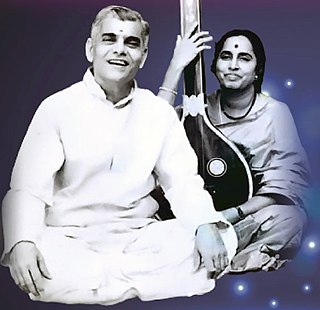
Palghat Kollengode Viswanathan Narayanaswamy, often referred to as K. V. Narayanaswamy was an Indian musician, widely considered to be among the finest Carnatic music vocalists of the 20th century. He was awarded the Madras Music Academy's Sangeetha Kalanidhi in 1986. He was described as the "Perfect Knight" of Carnatic music, a phrase from Geoffrey Chaucer, by V. K. Narayana Menon, art critic of India and recipient of the Sangeet Natak Akademi Fellowship.

Subbarama Dikshitar (1839–1906) was a Carnatic music composer. He was the grandson, and also the adopted son, of Baluswami Dikshitar, a brother of Muthuswami Dikshitar. He was an accomplished composer in his own right, but is more famous for his Sangita Sampradaya Pradarshini, a book detailing the works of Muthuswami Dikshitar and a reference on many other Carnatic musical concepts.
Paapanaasam Raamayya Sivan was an Indian composer of Carnatic music and a singer. He was awarded the Madras Music Academy's Sangeetha Kalanidhi in 1971. He was also a film score composer in Kannada cinema as well as Tamil cinema in the 1930s and 1940s.
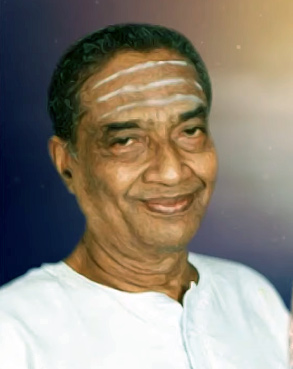
Damal Krishnaswamy Jayaraman, the renowned brother of D. K. Pattammal, was a professional Carnatic music singer. He was awarded the Madras Music Academy's Sangeetha Kalanidhi in 1990.
Palghat R. Raghu was a Carnatic musician and percussionist. He was awarded the Madras Music Academy's Sangeetha Kalanidhi in 2007.
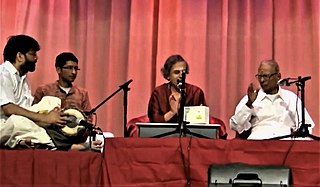
Rudrapatna Krishnashastri Srikantan, known as R. K. Srikantan, was a vocalist of the Carnatic musical tradition of South Indian music. He was awarded the Madras Music Academy's Sangeetha Kalanidhi in 1995.
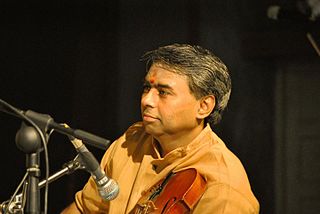
R. K. Shriramkumar is a virtuoso violinist and accompanist of the Carnatic Music. He hails from the Rudrapatna family of musicians from Karnataka. He is the grandson of the violinist R. K. Venkatarama Shastri and grand-nephew of R. K. Srikanthan.
K. S. Narayanaswamy, was a Carnatic veena exponent of the Thanjavur style, in which nuances and subtleties are given more importance over rhythm based acrobatics. He was awarded the Madras Music Academy's Sangeetha Kalanidhi in 1979.
The Rudrapatnam Brothers are an Indian Carnatic vocal duo, consisting of brothers R. N. Thyagarajan and Dr. R. N. Tharanathan. The brothers come from a family of musicians from Rudrapatna village off the Kaveri banks in Arkalgud Thaluk of Hassan district in the southwest Indian state of Karnataka. Vocalist Tiger Varadachariar, on seeing the musical atmosphere there, once claimed that "Rudrapatnam is the Thanjavur of Karnataka". Music, Veda adhyayana, and studying Sanskrit were integral parts of their family tradition.

Vellore G. Ramabhadran was a Mridangam artiste from Tamil Nadu, India. He was awarded the Madras Music Academy's Sangeetha Kalanidhi in 2004.
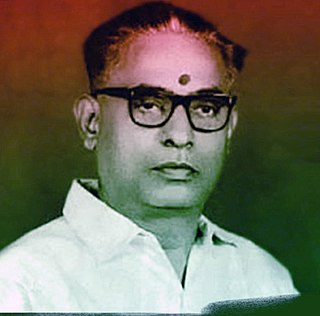
Balasubramaniam Rajam Iyer was a Carnatic singer from South India. He was awarded the Madras Music Academy's Sangeetha Kalanidhi in 1987.
Mudikondan Venkatarama Iyer was a South Indian Carnatic music singer and musicologist. He was also known as Mudikondan - the name of his native village.

T. M. Thyagarajan fondly known as TMT was a Carnatic vocalist and musicologist from Tamil Nadu in Southern India. He was awarded the Madras Music Academy's Sangeetha Kalanidhi in 1981.

"Vatapi Ganapatim", also known as "Vatapi ganapatim bhajeham" or "Vatapi ganapatim bhaje", is a Sanskrit kriti song by the South Indian poet-composer Muthuswami Dikshitar (1775–1835), one of the "Trinity of Carnatic music". The panegyrical hymn praises Vatapi Ganapati, Ganesha (Ganapati) worshipped in a shrine in Tiruchenkattankudi Utrapatishwaraswamy Temple dedicated to lord Shiva in Thiruvarur district in the Tamil Nadu state of India. The hymn is composed in Hamsadhvani raga ; however, in tradition of kritis, individual performers add their own variations in the tune as a part of improvisation. Vatapi Ganapatim is considered the best-known piece of Muthuswami Dikshitar and is one of the most popular compositions of Carnatic music. The hymn is traditionally sung at the beginning of many Carnatic music concerts.
T. K. Govindarao was the first Malayali film musician and a Carnatic musician.
Suguna Varadachari is a Carnatic vocalist and Carnatic music teacher from Tamil Nadu, India. She is also a Veena artist. She received several awards including Sangeet Natak Akademi Award and Sangita Kala Acharya Award by Madras Music Academy.
References
- ↑ V. Sriram (30 November 2012). "Music holds court, literally". The Hindu . Archived from the original on 26 November 2019. Retrieved 26 November 2019.
- 1 2 3 Mohan Parasaran. "Legal Personalities and their role in promoting Carnatic music - Part 1". carnatica.net. Archived from the original on 26 November 2019.
- ↑ "Past Presidents". musicacademymadras.in. Archived from the original on 2 June 2019. Retrieved 28 November 2019.
- ↑ "Sangita Kalanidhi Awardees". Archived from the original on 26 November 2019. Retrieved 26 November 2019.